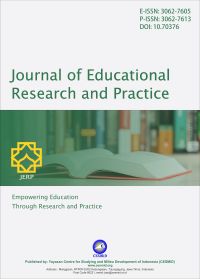About the Journal

Journal of Educational Research and Practice (JERP) is a peer-reviewed Open Access journal published by Yayasan Centre for Studying and Milieu Development of Indonesia (CESMiD) in formal collaboration with Perkumpulan Dosen Tarbiyah Islam Indonesia (PDTII). JERP is committed to disseminating research and innovative educational practices, focusing on bridging the gap between educational theory and practice. JERP welcomes contributions from educators, researchers, and practitioners worldwide, emphasising culturally responsive and contextually relevant studies.
Publication Details
- Publisher: Yayasan Centre for Studying and Milieu Development of Indonesia (CESMiD)
- ISSN Online: 3062-7605
- ISSN Print: 3062-7613
- DOI prefix: 10.70376/jerp
- Collaboration: Perkumpulan Dosen Tarbiyah Islam Indonesia (PDTII)
- Peer Review Process: Double-anonymous peer review
- Frequency: three times a year (January-March, April-July, August-November)
- Languages Accepted: English
- Abstracting & Indexing: Open Aire, Google Scholar, Garuda, etc.
Aims
Journal of Educational Research and Practice (JERP) aims to serve as a platform for disseminating research and evidence-based educational practices. Our primary objective is to bridge the gap between educational theory and practice, fostering a collaborative space for academics, practitioners, and policymakers. JERP emphasizes innovative, inclusive, and culturally responsive approaches to education, focusing on the intersection of local wisdom and global trends. By addressing challenges and opportunities in diverse educational contexts, particularly in Indonesia and the broader Southeast Asian region, JERP aspires to contribute to advancing knowledge and improving educational systems worldwide.
Scope
JERP welcomes original research articles, theoretical reviews, and practical case studies across a broad spectrum of topics in education. Submissions should align with one or more of the following areas:
| Educational Research |
|
| Educational Practice |
|
Frequency
JERP is published three times a year, with issues released in January-March, April-July, and August-November. This triannual publication schedule ensures a consistent dissemination of high-quality research and scholarly contributions in the field of education.
Objectives
JERP aims to foster the exchange of ideas and knowledge among academics, policymakers, and practitioners, creating a collaborative dialogue and mutual learning platform. It seeks to highlight educational innovations and culturally relevant practices that address the diverse needs of learners and educators. Furthermore, the journal promotes research that bridges local and global educational perspectives, contributing to a deeper understanding of education as a dynamic and interconnected field.
Audience
JERP's target audience includes researchers in the field of education who contribute to the advancement of knowledge through scholarly inquiry. It also addresses educators and practitioners working in schools and higher education institutions, providing them with insights and practical approaches to enhance teaching and learning. Additionally, the journal is intended for policymakers and stakeholders in the education sector, offering evidence-based research and innovative solutions to inform decision-making and policy development.
Submission Guidelines
Submissions must adhere to rigorous academic standards and demonstrate theoretical and practical significance. All manuscripts undergo a double-blinded peer-review process to ensure quality and relevance.
Accessibility
JERP is accessible to a global readership via its online platform. Authors benefit from a robust dissemination process, ensuring that published works reach diverse audiences in academia and practice. By focusing on the intersection of local wisdom and global educational trends, JERP aspires to be a leading journal that contributes meaningfully to advancing education research and practice.
JERP Abstracting and Indexing:
 |
 |
|
|---|---|---|
 |
 |
|
 |
 |
|
 |
 |
|
 |
 |
 |
 |








